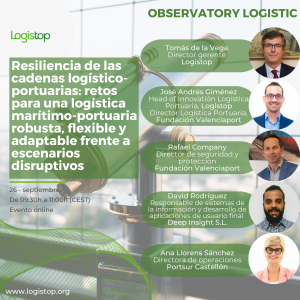-
The maritime-port sector continues to grow despite the disruptive events that are occurring.
-
Anticipation is a key factor in resilience management.
-
Technology as a lever for change in the face of challenges.
In the maritime-port logistics environment, resilience has become a vitally important issue. The ability to adapt and remain operational in the face of disruptive scenarios is essential for the competitiveness and efficiency of companies and operators that play a crucial role in the supply chain.
In the Logistic Observatory “Resilience of port-logistic chains: challenges for a robust, flexible and adaptable maritime-port logistics in the face of disruptive scenarios” organised by Logistop we have analysed how internal and external factors influence the resilience of port-logistic chains and how different experts approach this issue.
We were introduced by Tomás de la Vega, Managing Director, Logistop, moderated by José Andrés Giménez Maldonado, Head of Innovation Logística Portuaria, Logistop, and Director of Port Logistics, Fundación Valenciaport, nd with the interventions and contributions of Rafael Company, Director of Security and Safety, Fundación Valenciaport, David Rodríguez, CIO and Head of Information Systems and Development of End User Applications, Deep Insight S.L., and Ana Llorens Sánchez, Operations Manager, Portsur Castellón.

One of the challenges in the search for robust, flexible and adaptable maritime-port logistics is finding a balance between internal and external focus. Companies and operators have focused on improving the internal efficiency of their operations. However, in an increasingly globalised and disruptive world, it is essential to consider the external aspects that can positively or negatively influence the logistics chain.
Resilience in port management
Rafael Company stressed the importance of effective cooperation and proper risk management are essential to minimise negative impacts and capitalise on the opportunities that can arise in adverse situations.
Anticipation is fundamental for the resilience of port-logistic chains. Early identification of risks, their accurate quantification, implementation of mitigation measures and agile response are critical elements in resilience management. In this vein, Company added that good resilience management can generate opportunities to improve the efficiency and competitiveness of port operations.
“Today we face countless risks. Cooperation and proper management will enable us to minimise any negative aspects and turn risks into opportunities”
Rafael Company, Director of Security and Safety, Fundación Valenciaport
IoT monitoring, data management and decision-support tools
David Rodríguez highlighted the importance of real-time and personalised observation of port operations. Constant monitoring makes it possible to anticipate meteorological risks and reduce human risks, damage to infrastructure and loss of goods. To achieve this, Rodriguez highlighted three key elements: improving observation and data capture in infrastructures; adapting management systems to take advantage of the information collected; and generating business intelligence based on observation to make informed decisions.
All maritime operations are subject to ocean-meteorological risks, so, as Rodríguez pointed out, there is a need to delimit and predict risk in port activities in order to reduce human risks, damage to infrastructures and means and minimise loss of goods so that operational stoppages do not occur.
Therefore, the commitment to innovation is a key factor in anticipating and counteracting risks.
“The prediction of risk in port activities helps to reduce human risks, damage to infrastructures and means and minimise loss of goods, avoiding operational stoppages”
David Rodríguez, CIO and Head of Information Systems and End User Application Development, Deep Insight S.L.
Flexibility and adaptability to change
Ana Llorens stressed that resilience and the ability to adapt are not options, but necessities for all sectors involved in maritime-port logistics.
Among the current challenges that companies must face, Llorens highlighted a lack of demand in certain sectors such as ceramics or agriculture due to geopolitical aspects, inflation, lack of tariffs on entry from third countries, lack of R+D+i, increased demand for land transport, restrictions on the availability of port land, limitations on berthing lines, an uncertain legal framework and resistance to change, among others.
Concluding that, in a context of uncertainty, technology emerges as a key tool to address future challenges, together with the capacity to adapt to the changes that will be produced.
“Technology emerges as a key tool to address future challenges”
Ana Llorens Sánchez, Operations Manager, Portsur Castellón
About Logistop
At Logistop we transform the supply chain through innovation, helping industry and companies to become more efficient and sustainable.
We are a multidisciplinary and inter-territorial working space in the logistics innovation arena formed by all the actors involved in the supply chain, as well as universities, technology centres, associations and specialised consultancy firms.
One of Logistop’s main objectives is:
- To promote the need for innovation among companies involved in the logistics sector;
- To promote innovation projects;
- To communicate the real needs of the sector at an institutional level.

